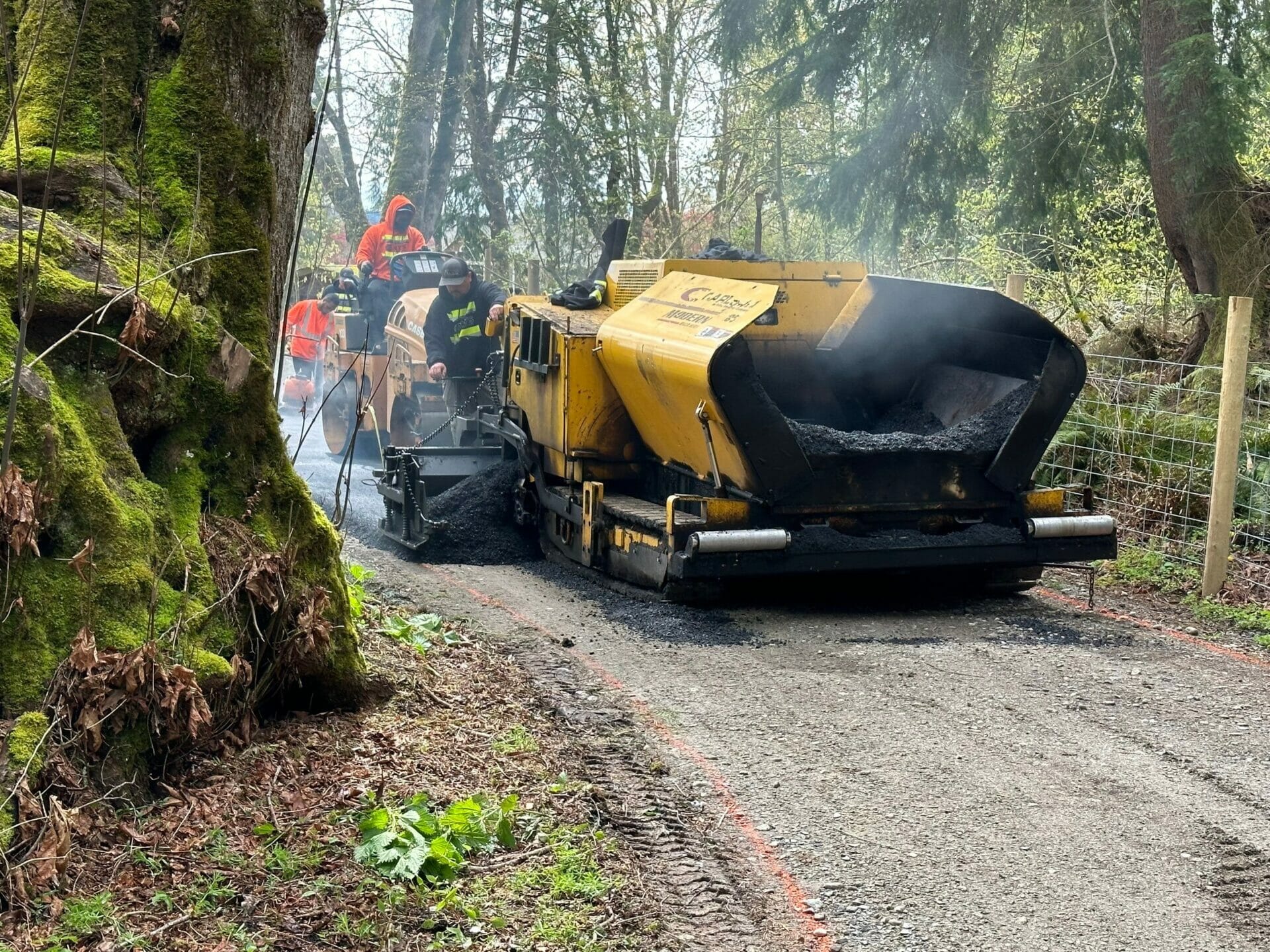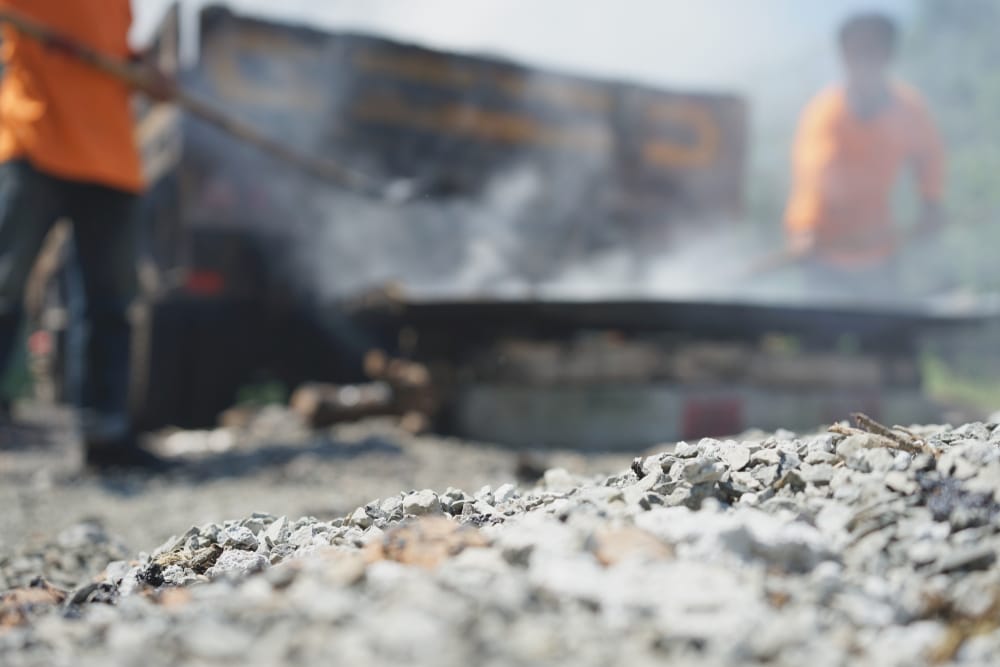Asphalt is a remarkably durable material, widely used for roads, parking lots, and driveways due to its ability to withstand heavy traffic and harsh weather conditions. However, achieving a long-lasting and high-performing asphalt pavement requires careful consideration of several factors, including asphalt temperature. This guide will explore why asphalt temperature is crucial during the paving process and how it influences the quality and longevity of your pavement.
Luckily, NYS Enterprises is a leading Washington paving company here to explain the various impacts of temperature on asphalt. In this blog post, we’ll also provide an overview of the types of asphalt temperatures to look out for, the best time to lay asphalt, and what happens when temps are too high or too low. But above all, we’ll explain why choosing a reputable asphalt company for your project is even more important than the number on the thermometer.
Why Asphalt Temperature Matters
Asphalt temperature plays a critical role in the paving process, affecting the workability, compaction, and ultimately, the performance of the pavement. Here’s why:
- Workability: Asphalt needs to be at the optimal asphalt temperature to be workable. If it’s too cold, it becomes stiff and difficult to spread and compact. If it’s too hot, it can become too fluid and difficult to control.
- Compaction: Proper compaction is essential for achieving a dense, durable pavement. The asphalt temperature significantly influences its ability to be compacted effectively.
- Bonding: The asphalt temperature affects how well it bonds with the underlying surface. Proper bonding is crucial for preventing slippage, cracking, and other forms of pavement distress.
Three Key Temperatures in Asphalt Paving
Understanding the different temperature factors involved in asphalt paving is crucial for achieving optimal results.
1. Asphalt Mix Temperature
This refers to the temperature of the asphalt mixture itself. It's crucial to maintain the mix within a specific temperature range during transport and placement to ensure proper workability and compaction.
Too Cold: If the mix is too cold, it becomes stiff and difficult to compact, resulting in a less dense and durable pavement.
Too Hot: If the mix is too hot, it can overheat the asphalt binder, leading to premature aging, cracking, and reduced lifespan.
2. Ambient Temperature and Asphalt Temperature
Ambient temperature, or air temperature, also influences the asphalt paving process. Ideal ambient temperatures for paving are typically between 50°F and 90°F. However, the asphalt temperature can be affected differently depending on the ambient temperature.
Cold Weather Paving: Paving in cold weather can be challenging, as the asphalt mix cools down quickly, making compaction difficult. Special techniques and additives may be necessary to ensure proper compaction and maintain the right asphalt temperature.
Hot Weather Paving: Paving in hot weather can also pose challenges, as the asphalt mix may become too fluid and difficult to control. Careful planning and execution are essential to prevent problems and manage the asphalt temperature effectively.
3. Ground Temperature and Asphalt Temperature
The temperature of the ground on which the asphalt is placed is another critical factor that can affect the asphalt temperature.
Frozen Ground: Paving on frozen ground is not recommended, as the thawing process can cause instability and damage to the pavement.
Hot Ground: Hot ground can cause the asphalt mix to cool too quickly, making compaction difficult and affecting the overall asphalt temperature.
The Importance of Proper Compaction
Compaction is the process of using heavy rollers to compress the asphalt mix, removing air voids and creating a dense, durable pavement. Proper compaction is crucial for:
- Increasing Density: A dense pavement is more resistant to water penetration, cracking, and other forms of damage.
- Improving Stability: Compaction enhances the stability of the pavement, preventing rutting and deformation under traffic loads.
- Enhancing Durability: A well-compacted pavement is more durable and can withstand heavy traffic and harsh weather conditions.
- Improving Lifespan: Proper compaction significantly extends the lifespan of the asphalt pavement, reducing the need for frequent repairs or premature replacement.
Achieving Optimal Compaction
Several factors influence the effectiveness of compaction, including asphalt temperature:
Mix Temperature: The asphalt mix must be at the optimal temperature for proper compaction.
Compaction Equipment: Using the right type and size of compaction equipment is crucial.
Compaction Timing: Compaction must be performed while the asphalt is still hot and workable.
Number of Passes: The number of passes with the compactor will depend on the thickness of the asphalt layer and the type of compactor used.
Experience and Skill: The operator's experience and skill play a significant role in achieving optimal compaction.
The Best Time To Lay Asphalt
In a perfect world, asphalt would be installed when the ground temperature and air temperature are both on the moderate side, which is most often during the late spring, summer, and early fall. While it would be ideal to have the temperatures to a certain degree, it is not 100% necessary when you have a skilled and experienced paving contractor.
Prior to installation, your contractor should take all the necessary precautions like scoping out the grounds, implementing proper drainage systems, grading & sloping, and ensuring proper compaction. Those things are going to be much more important for the quality and longevity of your asphalt – especially here in the Seattle area, where we are no stranger to rainfall and cold temps.
The Role of Compaction in Asphalt Paving
To ensure a seamless installation, lasting durability and strength of the asphalt, and the safety of the contractors on the job site, proper compaction is vital. It locks the layers together and, in turn, reduces the risk of premature pavement failure, cracking, potholes, and other damages. It’s the secret to professionally installed asphalt pavement that stands the test of time.

The Importance of Choosing a Reputable Asphalt Contractor
Asphalt paving is a complex process that requires expertise and specialized equipment. Choosing a reputable asphalt contractor is crucial for ensuring a successful project. An experienced contractor will:
- Understand the importance of temperature and compaction.
- Have the knowledge and skills to achieve optimal compaction.
- Use high-quality materials and equipment.
- Follow industry best practices.
- Provide warranties or guarantees on their work.
Contact NYS Enterprises for Professional Asphalt Paving
Asphalt temperature is a critical factor that significantly influences the quality, durability, and lifespan of your pavement. By understanding the importance of asphalt temperature and working with a qualified asphalt contractor, you can ensure a successful paving project that delivers long-lasting results.





